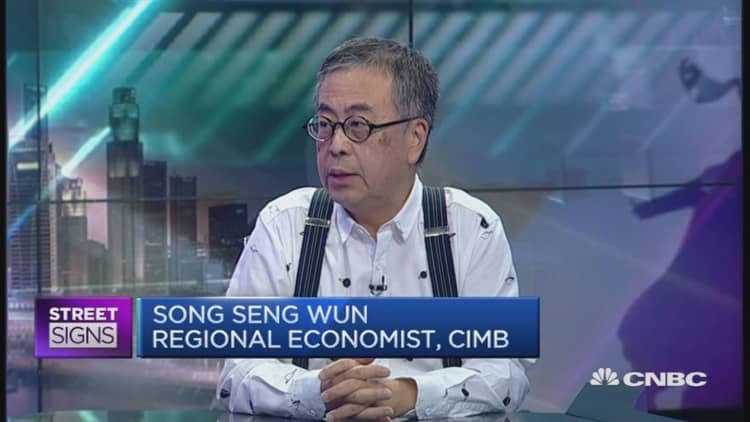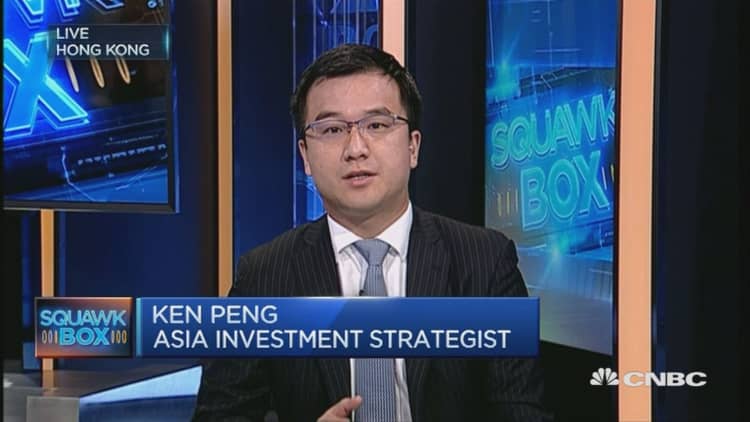It's hard for American investors to get their hands on shares that trade in China. But that may change.
Major stock index firm MSCI has so far excluded Chinese mainland-listed "A Shares" from its prominent emerging markets index. But on Tuesday, MSCI is set to announce a decision on whether it will add Chinese shares to the index. If it includes them, U.S. investors could potentially be snapping them up as early as next year. The MSCI announcement is expected at 5 p.m. ET.
Right now, the Chinese shares listed in the emerging market index are all traded in either Hong Kong or the United States. That means the world's second-largest economy makes up only about one-fourth of the benchmark index, while full inclusion of A shares would bring that ratio to more than one third. With about $1.5 trillion in assets under management tracking the index, China is keen to tap those funds as foreign investors search for returns outside their home markets.
MSCI rejected the Chinese shares last June, citing uncertainty about who actually owns the shares and how easily investors can withdraw their money from Chinese investments. Since then, some analysts say China may have reformed its markets enough to get included — but issues around transparency and access linger.
For example, China's stock market crashed last summer, and some of its stocks have been suspended for months.
"There are still some worries about voluntary suspensions," Ian Hui, a global market strategist at JPMorgan Asset Management, told CNBC in an email. "Overall, I think it's possible for inclusion to be announced this month, but the house view is that it's more likely happening within the next 1 or 2 years, since there are still some lingering issues."
Potentially tipping the balance toward MSCI inclusion is China's announcement last week that it will give the United States a high ceiling on how much it can invest in Chinese assets using yuan that are traded outside the mainland.

"I think MSCI has always said it's a matter of if, and not when. Based on the news (last) Monday night, there's a high probability," said Brendan Ahern, chief investment officer of China-ETF firm KraneShares.
The allotment is the first granted to the United States through a five-year-old scheme called the Renminbi Qualified Foreign Institutional Investor (RQFII) program. Analysts mostly saw the initial announcement as a positive gesture to further open the channel of U.S. investment in Chinese assets, and helpful toward China's goal of increased overseas use of the yuan. Among the few program details available so far, one Chinese and one U.S. bank will be designated as clearing hubs for the currency.
"The fact that the U.S. got such a huge RQFII quota is a clear indication someone is trying to move the line," said Anthony Skriba, executive director at Z-Ben in New York.
The 250 billion yuan ($38 billion) quota is second only to Hong Kong's in size, and came during U.S. Treasury Secretary Jack Lew's visit to Beijing for the China-U.S. Economic and Strategic Dialogue.
"This will support the competitiveness of the U.S. financial and corporate sectors and improve U.S. investors' access to China's onshore capital markets," Lew said in a release. He also said China remains committed to avoiding competitive devaluation of the yuan.
That said, not every market watcher expects the decision to go China's way immediately.
"They want to persuade MSCI they are ready, but I think from fundamentals they aren't ready," said William Kwok, founder and CEO of ChinaQFII.com, a Hong Kong-based firm which provides information on foreign investment trends in China. He noted China expanded the United Kingdom's RQFII quota allotment last fall, just ahead of Chinese President Xi Jinping's London visit.

If Tuesday's announcement is favorable, MSCI has said the initial weighting of China A shares in the emerging market index will be just 1.1 percent. Even that addition would not go into effect until June 2017, MSCI said in an April report, and subsequent increases would depend on "positive market liberalization developments."
"I have no confidence those changes will be made in good time," said Scott Kennedy, director of the Project on Chinese Business and Political Economy at the Center for Strategic and International Studies.
"There's a lot of policy volatility in China," he said.
On May 27, the Shanghai and Shenzhen stock exchanges announced revised rules limiting stock suspensions to 3 months for restructuring, 1 month for a non-public offering and 10 days for events such as shareholder meetings.
However, as of this week, more than 10 percent of A shares on the Shanghai and Shenzhen exchanges remain halted, according to data from Wind Information.
"As trading halts occur, it becomes difficult to value the stocks," said Chris Johnson, vice president of ETF sales and trading at Macquarie. "Some vast percentage of A shares have been halted over days and weeks. How do you value those stocks while those ETFs are still trading over here?"
If MSCI delays A Share inclusion, U.S. investors do have other options for accessing the mainland shares. Vanguard's $52 billion Emerging Markets Stock Index ETF (VWO) began adding A share exposure last June. It is up more than 8 percent over the last six months, versus the S&P's 4 percent return and the iShares MSCI Emerging Market ETF (EEM)'s 6 percent gain. The Shanghai composite is down more than 15 percent over that time.


